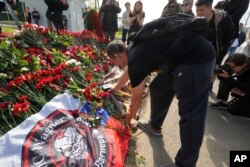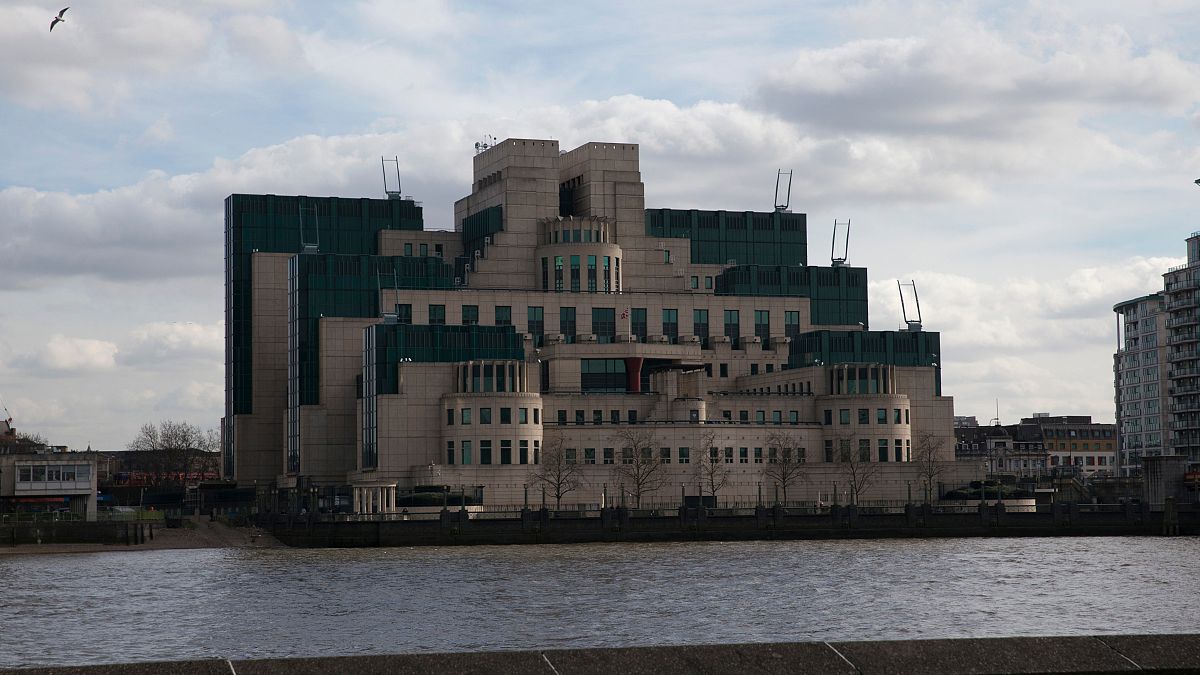When Russian businessman Yevgeny Prigozhin was killed in an August 2023 plane crash, many analysts said his death could mark the end of the Wagner Group, the private military company he co-founded that provided thousands of Russian mercenaries for Moscow’s initiatives and other interests abroad.
But more than a year later, the picture of Russian mercenary activities has only grown more complicated, researchers say.
Before Prigozhin’s death, Wagner’s mercenaries had fought in conflicts around the world –– from Ukraine to the Middle East and Africa –– and helped Russia to spread its influence far beyond its borders.
Along the way, Wagner faced allegations of murdering African civilians and committing war crimes.
Then, in June 2023, Prigozhin launched an unexpected insurrection against Russian authorities over their handling of the war in Ukraine. His mercenaries captured the city of Rostov-on-Don and marched on toward Moscow. Prigozhin stood down only after the president of Belarus, Alexander Lukashenko, mediated a deal.
After such brazen insubordination, many were unsurprised when Prigozhin died in a plane crash less than two months later. But predictions that the Wagner Group’s activities would die with him have proven to be untrue.
Wagner Group fighters are still active in the Central African Republic and Mali. In other countries like Niger, it has been replaced by Africa Corps, a successor organization subordinate to Russia’s defense ministry. In other cases, different Russian militarized structures have picked up the Wagner name and symbols.
What is clear to analysts is that Russian mercenaries are not going away. If anything, the future of Russian private military companies will be "more sustainable and less spectacular" according to Jack Margolin, an independent researcher who recently published a book on the Wagner Group.
Since Prigozhin’s death, Russia has "really effectively created infrastructure and incentive structures in order to draw in former [Wagner] fighters and build this system of semi-formal forces," he told VOA.
Ties with the Russian state
The Wagner Group’s activities around the world have always been intertwined with Russian foreign policy, but the exact nature of that connection is a subject of debate among experts.
Margolin notes that Wagner co-founder Dmitry Utkin –– who also died in the August 2023 plane crash –– served in the special forces of Russia’s foreign intelligence agency, commonly called the GRU. Around 2014, he and Prigozhin founded the Wagner Group, which was initially small.
That same year, Wagner took part in the illegal Russian annexation of Ukraine’s Crimean peninsula. Later, the mercenaries were dispatched to the pseudo-state Russia propped up in the eastern Ukrainian region of Luhansk.
During this period, there is ample evidence that Wagner actively cooperated with the Russian defense ministry –– in part because Ukraine intercepted Wagner conversations with Russian officers.
But when Wagner operations moved beyond Ukraine, the picture grew more complicated. Experts differ on how to interpret it.
Maria Kucherenko leads Russian studies at the Ukraine-based Come Back Alive Initiatives Center. She believes that Wagner was created by Russian military intelligence and remains under its control.
For this reason, she views the post-Prigozhin changes in the mercenary corps as largely superficial.
"Only the surnames of the GRU generals in charge have changed," she said.
Other analysts paint a more complex picture of Wagner’s ties with the Russian state. Margolin sees a greater degree of freedom in Wagner’s past activities.
"They acted in the GRU’s interest. They coordinated with the GRU. All of Wagner's operations abroad were supported by logistics that were owned by the Ministry of Defense," he said. "But at the same time, they were still able to determine in this local context exactly what they wanted to do."

John Lechner, a researcher who will publish a book on Wagner in March, believes the mercenary corps’ relationship with the Russian state heavily depended on the country where it was operating.
In Ukraine and Syria, where the mercenaries backed the government of Bashar al-Assad, Wagner actively collaborated with the Russia’s defense ministry. But in sub-Saharan Africa, where the Russian state had a very limited presence, Wagner was able to decide what Russia’s national interests were, Lecher said in an interview.
Wagner wasn’t "just a shadowy arm of the Kremlin pursuing the Kremlin’s interests; they were creating them," he said.
What next?
Since Prighzoin’s death, Wagner has undergone significant changes –– although analysts disagree about how fundamental they are.
Russian journalist Ilya Barabanov, who coauthored a Russian-language history of Wagner, believes that the old private military company essentially no longer exists.
"Over the last year and a half, we’ve seen Prigozhin’s empire being broken apart," he told VOA. "Some [parts] are going to the Ministry of Defense. Some are going to the Russian National Guard. Some are going to Chechnya’s Akhmat special forces."
The original Wagner, meanwhile, continues to operate only in the Central African Republic, Mali, and Belarus.
Despite these changes, the dissolution of Wagner is going more slowly than expected because the Kremlin is too busy waging war in Ukraine, Barabanov added.
Margolin emphasizes that Russia’s successor mercenary structures won’t function the same way Wagner did.
The Wagner Group stood out for its risk appetite and relative independence from the Russian government. In the Central African Republic, it was Wagner that decided to transition from a strategy of defending the capital of Bangui and the country’s political elite to a more aggressive battle with insurgents, he notes. Wagner also decided with whom it would do business.
In contrast, Africa Corps and other successor companies are much more risk-averse and more actively coordinate their activities with Russian military intelligence, Margolin said.
Lechner notes that efforts to replace Wagner have been more successful in some places than others.
Starting in 2019, Wagner mercenaries fought in Libya on the side of rebel general Khalifa Haftar. But in October 2020, he signed a ceasefire with the United Nations-backed Libyan government. Because active fighting had stopped, Russia had little trouble replacing Wagner there with Africa Corps, Lechner said.
In Mali, Wagner mercenaries are engaged in pitched battles with Tuareg separatists and Islamist fighters in the country’s north. In late July, dozens of Russian fighters were killed in an ambush near the town of Tinzaouaten.
Lechner suggests that in the future there will be multiple "mini-Prigozhins" in charge of Russian military companies, but not one individual with "all of the political clout and business interests that Prigozhin had come to represent."
Both Margolin and Lechner agree that, while Wagner is no longer officially fighting in Ukraine, its influence on that conflict has been significant.
Journalists have often pointed out Wagner’s usage of so-called "meat storms," when the company was willing to sacrifice waves of men to wear down Ukrainian forces. The tactic was particularly noticeable during the 2022-23 battle for the Ukrainian city of Bakhmut, which Russia eventually razed and captured.
But Wagner also gained military experience in the Middle East and Africa that the official Russian military is now applying in Ukraine: for example, devolving command authority to lower echelons and small unit tactics, Margolin said.
"Wagner has in many ways achieved the thing that Prigozhin said was necessary during the siege of Bakhmut, which was that the Russian armed forces needed to become more like Wagner to be more effective," he told VOA.
Lechner refers to it as the "Wagnerization of the Russian military."
Resisting Russian mercenaries abroad
Regardless of exactly what structures succeed Wagner, Russian mercenary activities will likely continue to worry Western governments. Experts say it will be difficult to push back against their influence abroad.
Ukrainian researcher Kucherenko believes that the U.S., European countries, Ukraine, and other partners must join forces to counteract Russian mercenaries. But she suggests they must look higher in the command structure.
"We need to evaluate them as representatives of the GRU itself," she said.
She suggests directing particular attention to Yunus-bek Yevkurov, Russia’s deputy defense minister, and Major General Andrei Averyanov, the reported former commander of a secretive military intelligence unit that has conducted assassinations abroad. Both men now are reputed to play key roles in Africa Corps.
Margolin suggests that, among other efforts, the U.S. should focus on export controls to limit the mercenaries’ access to military technologies, especially drone technologies, which played a key role in Wagner’s activities in Ukraine.
He also suggests that Western governments should be cautious about propping up African regimes with poor human rights records and entrenched corruption, despite any fears that Russia will rush in if they do not.
In fact, engaging with such governments feeds popular anger against the West, which in turn provides "fertile ground for organizations like Wagner to take root," Margolin said.
Lechner notes that Wagner expanded its presence in Africa as Western powers exited the continent.
For example, France withdrew its forces from the Central African Republic in 2016 amid a civil war in the country. Wagner stepped in to provide security for the country’s leadership.
"I don't think there is any interest for the United States to put troops on the ground in Africa to be perfectly honest," Lechner said. Short of that, he said, "I'm not exactly sure what [Western powers] can offer."
Russian mercenaries have few similar competitors in the region. Though China is active in Africa, its activities are mainly focused on large economic investments. Even Wagner’s business activities have mostly not placed it in conflict with China.
Russian journalist Barabanov suggests there is one more factor that will play a key role in determining the future of Russian mercenaries: Russia’s war against Ukraine.
If that conflict ends, then "the Russian government will have a huge human resource of veterans who fought in this war," he said, "and they can probably be used in other, far-off conflicts."

 By Voice of America (Europe) | Created at 2024-11-29 11:11:56 | Updated at 2024-11-29 14:38:02
3 hours ago
By Voice of America (Europe) | Created at 2024-11-29 11:11:56 | Updated at 2024-11-29 14:38:02
3 hours ago







